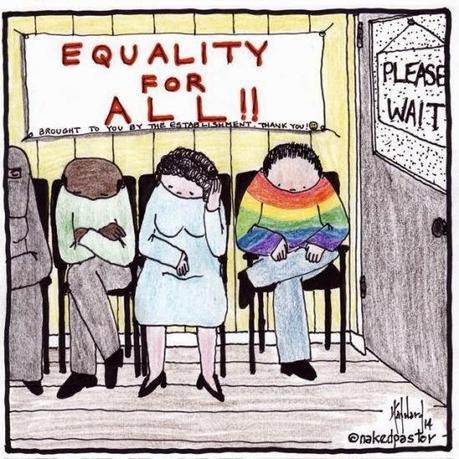 (The cartoon above is by David Hayward & can be found at his website called nakedpastor.)
(The cartoon above is by David Hayward & can be found at his website called nakedpastor.)The other day Jim DeMint, head of the right-wing Heritage Foundation, said something particularly ignorant -- that slavery wasn't ended by government, but by "a growing movement among the people, particularly people of faith, that this was wrong". This is revisionist history at its worst. While there were some people, including religious people, who had fought for many years to end slavery (they were called abolitionists), it was the government (by raising an army and fighting a bloody war) that actually ended slavery.
But DeMint's ridiculous statement got me thinking about religion -- particularly the christian church. I was raised in a fundamentalist church, and taught that religion was a force for good in the world. And I venture to say that I think most, if not all christians, were taught that (and may even believe it). But, is it true. Is the church a force for good?
I think a good case can be made that it is not. That doesn't mean that all christians are bad people. Some actually try to follow the teachings of their "savior" -- and like the abolitionists before the Civil War, try to make the changes in our society to make it better for everyone. But let's be honest. The abolitionists were a minority, and they were outnumbered by "christians" who either believed slavery was right (and what god wanted) or by churches that didn't want to rock the boat by taking a stand on the issue.
And even after slavery was ended, did the churches step up and demand that African-Americans be treated equally? A few did, but the majority treated the issue the same way they did with slavery. They either believed and defended segregation and other forms of Jim Crowism were right (and what god wanted) or they again didn't want to rock the vote by bringing the issue up for debate. It took government, not religion, to end Jim Crow and guarantee equal rights under the law for African-Americans.
And it has not changed today. Most churches either oppose equal rights for the LGBT community, or don't want to rock the boat by pressing the issue. And most churches, while proclaiming women have equal rights, refuse to actually grant them those rights (whether in pay, control of their own bodies, or leadership positions).
In the 19th Century, Karl Marx wrote that religion was the "opiate of the masses" -- that by keeping people's attention on the next world, leaders were able to keep them from demanding justice and equality in this world. He was right (whether you agree with his economic theories or not).
The truth is that most churches, and therefore most religious people, are not a force for good. They are a force mainly used to protect the status quo -- because regardless of what religion may teach, people are afraid of change (afraid they might lose some privilege they currently enjoy) and they will oppose change even if that change would help others. And the churches they inhabit follow them, instead of leading them (because those churches are as afraid of change as their members).
I wish churches were a force for good in our society (and the world). If they were, we would probably live in a much better world. But sadly, except for a tiny minority, they are not. Most exist to protect the status quo (even to the point of protecting and trying to justify the bigotry of their members). It takes courage and the willingness to take chances to be a force for good -- and those are not qualities that most churches, church leaders, and church members just don't have.

